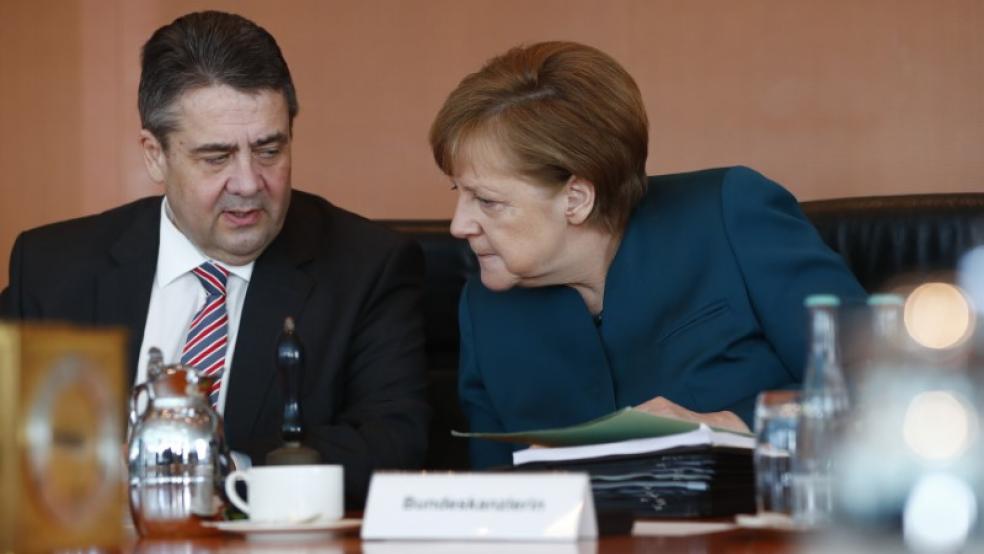BERLIN (Reuters) - Germany and France said on Monday the close result in Turkey's referendum on expanding President Tayyip Erdogan's powers showed the division in Turkish society, while others questioned Europe's relations with the country.
German Chancellor Angela Merkel and Foreign Minister Sigmar Gabriel said it was a big responsibility to bear for Erdogan, who declared a narrow victory in the vote that marked the biggest overhaul of modern Turkish politics.The result prompted renewed calls by Austria for Turkey's EU stalled accession talks to be halted. Germany's Gabriel called for a new format for talks with "our neighbor", comments echoed by the conservative bloc in the European Parliament. Erdogan's opponents said the vote was marred by irregularities and they would challenge the result.The Council of Europe rights organization said it did not live up to its standards, citing an inadequate legal framework and late changes in ballot counting. OSCE observers made similar comments, which were dismissed by Turkey. "The German government ... respects the right of Turkish citizens to decide on their own constitutional order," Merkel and Gabriel, whose country has about 3 million residents of a Turkish background, said in a statement."The tight referendum result shows how deeply divided Turkish society is and that means a big responsibility for the Turkish leadership and for President Erdogan personally."They expected Ankara to have a "respectful dialogue" with all parts of Turkish society. The United States also called for all citizens' rights to be respected.France's President Francois Hollande said: "It's up to the Turks and them alone to decide on how they organize their political institutions, but the published results show that Turkish society is divided about the planned deep reforms."EU TALKSOn Sunday, the European Commission said Turkey should seek a national consensus on the constitutional amendments, given the narrow majority and the extent of their impact. In March, the Venice Commission, a panel of legal experts at the Council of Europe, said the proposed changes to the constitution represented a "dangerous step backwards" for democracy.Merkel and Gabriel pointed to the Commission's reservations and said that, as a member of the Council of Europe and the OSCE security and human rights watchdog and an EU accession candidate, Turkey should quickly address those concerns."Political discussions about that need to take place as quickly as possible, both at the bilateral level and between the European institutions and Turkey," Merkel and Gabriel said.France also called on Turkey to respect the European Convention on Human Rights and its ban on the death penalty.Erdogan told supporters on Sunday that Turkey could hold another referendum on reinstating the death penalty. Such a move would spell the end of Turkey's EU accession talks.Austria, which has repeatedly called for halting membership talks, called once more for them to stop."We can't just go back to the daily routine after the Turkey referendum. We finally need some honesty in the relationship between the EU and Turkey," said Foreign Minister Sebastian Kurz, adding the bloc should instead work on a "partnership agreement".Gabriel said during a visit to Albania that too many people in Europe, some for reasons related to domestic policy, would now urge a rigorous attitude towards Ankara and call for an end to talks but he said he wanted to find "new formats for talks instead because Turkey is still our neighbor".Turkey has been on a decades-long quest to join the EU. Turkey and the bloc last year reached a deal to help stem the flow of migrants to Europe's shores.The head of the European People's Party in the European Parliament, Manfred Weber, called for "a new approach to a partnership between friendly neighbors". "We should offer Turkey a thematic partnership, for example on the fight against terrorism, migration and economic policy, as well as student and cultural exchange. However, this also means that Turkey's EU membership is off the table," he said.During the campaign, Erdogan repeatedly criticized European countries, including Germany and the Netherlands, accusing them of "Nazi-like" tactics for banning his ministers from speaking to rallies of Turkish voters abroad.Turkish Deputy Prime Minister Mehmet Simsek told Reuters on Monday he expected the "noise" between Ankara and Europe should die down after the European elections cycle. The French vote for a new president begins on Sunday. Germany votes in September. (Reporting by Michelle Martin, Maria Sheahan, Silke Koltrowitz, Leigh Thomas, Robert-Jan Bartunek and Reuters TV in Berlin; Editing by Alison Williams)European leaders say vote shows 'deeply divided' Turkey

Fabrizio Bensch



